|
|
|
Sort Order |
|
|
|
Items / Page
|
|
|
|
|
|
|
| Srl | Item |
| 1 |
ID:
113607
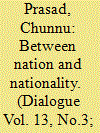

|
|
|
| 2 |
ID:
115001
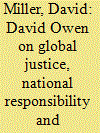

|
|
|
| 3 |
ID:
188603


|
|
|
|
|
| Publication |
Orlando, Harcourt Brace and Company, 1998.
|
| Description |
xi, 195p.pbk
|
| Series |
Case Studies in Cultural Anthropology
|
| Standard Number |
0155019708
|
|
|
|
|
|
|
|
|
|
|
|
Copies: C:1/I:0,R:0,Q:0
Circulation
| Accession# | Call# | Current Location | Status | Policy | Location |
| 060284 | 951.004941/GLA 060284 | Main | On Shelf | General | |
|
|
|
|
| 4 |
ID:
078251


|
|
|
|
|
| Publication |
2007.
|
| Summary/Abstract |
In recent decades, ethnicity has received increasing academic attention - and popular acceptance - as a core aspect of identity and one that is particularly relevant to immigrants. But is this notion of ethnicity salient to the immigrants themselves? This article provides a set of quantitative snapshots of the way new arrivals to the United States identify themselves and their children. The data - a set of annual surveys of recent refugee arrivals - suggest that in response to specific questions about "ethnicity," newcomers often provide what from American perspectives are not "ethnic" responses. In particular, race and religion are frequently offered as ethnic identity. Furthermore, nationality can also override ethnicity. Parents, for example, sometimes categorize recent United States-born children as ethnically "American" even though the rest of the family retains its previous non-United States identity. Such identity choices reveal much about the starting point of migrant adjustment. They are also invaluable for the broader analysis of the logic, history, contingencies, and internal tensions of United States - and Euro-American - notions of ethnicity
|
|
|
|
|
|
|
|
|
|
|
|
|
|
|
|
| 5 |
ID:
089333
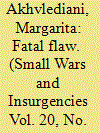

|
|
|
|
|
| Publication |
2009.
|
| Summary/Abstract |
This paper examines the role of the media during and after the August invasion of Georgia by Russian troops. It shows how on both sides the media responded to strong pressures to report the conflict from a very one-sided perspective. Indeed the conflict can be seen as a media as much as a military conflict as both sides struggled to present themselves in the best possible light before the international community and to exaggerate the losses that had been inflicted on their own rather then their enemy's forces. The article details the way this conflict was played out in printed media and TV as well as Internet blogs and provides information on the cyber war, which also broke out between the rival states.
|
|
|
|
|
|
|
|
|
|
|
|
|
|
|
|
| 6 |
ID:
124656
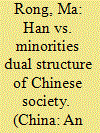

|
|
|
|
|
| Publication |
2013.
|
| Summary/Abstract |
While the "rural vs urban dual structure" has been a key issue for decades since China's social reform in the 1980s, the "Han vs minorities dual structure" receives scant attention in contemporary China. In the latter, Chinese citizens are differentiated by aspects of ethnic identity, administrative units, academic disciplines, education and even in arenas like entertainment and sports. A series of preferential policies targeted at ethnic minorities has been implemented by the government, e.g., family planning, school enrolment, financial assistance, personnel promotion and even the judicature. This dual structure, based on Stalin's theory and the Soviet system, emerged after China launched the "nationality/ethnic recognition" campaign in the 1950s. Many studies have proven that this system strengthened the "nationality" consciousness of each ethnic group but may otherwise be detrimental to national unity. This article offers a historical overview of China's transition from a traditional "central kingdom of the earth" into a modern nation-state, and detailed discussions about the Communist Party of China's new ideological framework on the "nationality/ethnic question", as well as the role that the "Han vs minorities dual structure" plays in contemporary China.
|
|
|
|
|
|
|
|
|
|
|
|
|
|
|
|
| 7 |
ID:
031179
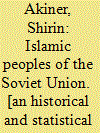

|
|
|
|
|
| Edition |
2nd ed.
|
| Publication |
London, KPI Limited, 1986.
|
| Description |
xiii, 462p.: maps, tableHbk
|
| Standard Number |
071030188X
|
|
|
|
|
|
|
|
|
|
|
|
Copies: C:1/I:0,R:0,Q:0
Circulation
| Accession# | Call# | Current Location | Status | Policy | Location |
| 028280 | 947.02971/AKI 028280 | Main | On Shelf | General | |
|
|
|
|
| 8 |
ID:
076579
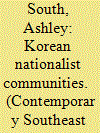

|
|
|
| 9 |
ID:
138300
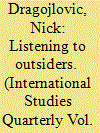

|
|
|
|
|
| Summary/Abstract |
Does nationality disadvantage foreign actors when they attempt to persuade the American public? Using data from an online survey experiment administered to a sample of US citizens, we find that the nationality of British and French advocates only reduces persuasiveness among American Republicans with low levels of political awareness. Among American Democrats, credible French or British advocates can be more persuasive than a comparable American source. Overall, foreign messengers from friendly countries are not disadvantaged by nationality, as nationality has low political salience and other domestic characteristics (such as partisanship) dominate subjects' heuristic processing. When a foreign advocate's nationality does play a role, however, it is likely to lead to polarization in domestic audience attitudes.
|
|
|
|
|
|
|
|
|
|
|
|
|
|
|
|
| 10 |
ID:
095358
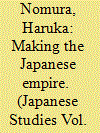

|
|
|
|
|
| Publication |
2010.
|
| Summary/Abstract |
This paper aims to reconnect the history of modern Japan with that of Japan's colonies by examining debates over the legal inclusion and exclusion of colonial Taiwan in 1899. It examines why and how an inconsistent legal structure evolved within the Japanese Empire. I argue that the creation of the Japanese nation was intertwined with the empire, and that this can be seen in the discriminatory deployment of the Family Register and Nationality Laws. Japan included Taiwan within the scope of the Nationality Law to achieve full sovereignty over its territory but also excluded the colonised people of Taiwan from the family register system to deny them citizenship. The rapid reconfiguration of the idea of 'Japan' under the strong influence of the West added significant ambivalence to this process, and thus to the making of the nation-empire.
|
|
|
|
|
|
|
|
|
|
|
|
|
|
|
|
| 11 |
ID:
061837
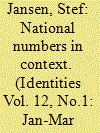

|
|
|
|
|
| Publication |
Jan-Mar 2005.
|
|
|
|
|
|
|
|
|
|
|
|
|
|
|
|
| 12 |
ID:
106037
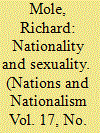

|
|
|
|
|
| Publication |
2011.
|
| Summary/Abstract |
This article seeks to understand why attitudes towards homosexuality in Latvia appear to be more intolerant than in all other EU member states. It argues that, while the impact of religion, the legacy of communism and post-communist transition have all played a role in shaping attitudes towards homosexuality in Central and Eastern Europe, these factors do not explain sufficiently the divergence among post-communist states and, in particular, do not account for Latvia's extreme position. While acknowledging that intolerance towards non-heteronormative sexuality cannot be explained by a single factor but is the cumulative effect of a range of social influences, this study argues that homosexuality is particularly reviled in Latvia because it has been constructed discursively as a threat to the continued existence of the nation in its desired ethnic form and to the core values defining Latvian national identity.
|
|
|
|
|
|
|
|
|
|
|
|
|
|
|
|
| 13 |
ID:
073594


|
|
|
|
|
| Publication |
2005.
|
| Summary/Abstract |
This article examines the intersection of gender and national identity in an Israeli university, focusing on the Women's Studies classroom. Taking into consideration the overshadowing effect of the Israeli-Palestinian conflict, we wondered how exposure to Women's Studies' egalitarian ethos and studying in a mixed Palestinian-Jewish classroom affects the feminist solidarity and national identity of young women students. In-depth interviews with eleven Palestinian and twelve Jewish Women's Studies' graduates indicate that solidarity between women of the two groups is built around women's issues, such as equal employment opportunities and reforms in the educational system. Considering the solidarity built around women's, as opposed to feminist, issues, it seems that national differences override the potential for a feminist solidarity.
|
|
|
|
|
|
|
|
|
|
|
|
|
|
|
|
| 14 |
ID:
114504
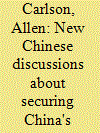

|
|
|
|
|
| Publication |
2012.
|
| Summary/Abstract |
This article places the emergent Chinese discussion about frontiers into a broader historical context. It then turns to a detailed analysis of the heterodox stances on frontiers that Yu Xiaofeng and Xu Lili, and Ma Rong have recently articulated. The conclusion notes that such relatively iconoclastic approaches to territory still stand outside the mainstream of official policy and elite writing about China's boundaries. However, it will also maintain the writings that are the focal point of this article have nonetheless begun to carve out a space for re-imagining China's current approach to territory and nationality.
|
|
|
|
|
|
|
|
|
|
|
|
|
|
|
|
| 15 |
ID:
187463
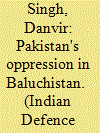

|
|
|
| 16 |
ID:
151055


|
|
|
|
|
| Summary/Abstract |
This article challenges many long-held assumptions about the treatment of Koreans in Occupied Japan (1945–1952). The central premise of this article is that scholars have treated “race” and “nationality” as equivalent categories of analysis. During the Occupation, Koreans were legally Japanese nationals, notwithstanding their Korean ethnicity or their desire to be recognized as “Korean nationals.” Nationality is an appropriate lens through which to study Koreans in Japan since they were legally Japanese nationals, but both North Korea and South Korea claimed them as their own nationals. By using the Koreans’ Japanese nationality as the unchanging fact, this article examines how race, nationality, and ideology intersected into the early Cold War in Asia to deal with a Korean population in Japan that was overwhelmingly in support of North Korea’s Kim Il-sung. This article brings to light a secret Cold War plan to deport tens of thousands of leftist Koreans from Japan during the Korean War to United Nations prisoner-of-war camps in South Korea. Since Koreans in Japan could not be legally deported from their ostensible home country (Japan), Occupation authorities devised a rationale that would overcome legal barriers.
|
|
|
|
|
|
|
|
|
|
|
|
|
|
|
|
| 17 |
ID:
125913


|
|
|
|
|
| Publication |
2013.
|
| Summary/Abstract |
This article traces the 'otherisation' of US denizens of Haitian descent during the 1980s and 1990s, subsequent to their incorporation into the '4-H club' as 'Haitians', regardless of their citizenship. It argues that by collapsing the categories Haitian-Americans and Haitian immigrants into 'Haitians' and by accusing this collectivity of bringing HIV/AIDS to the United States, the US medical and political leadership and sectors of the media nullified the Haitian-Americans' US citizenship and maligned both groups' identity, promoting their alienation from the larger US population. It concludes with a plea to reframe the concept of citizenship and reassess the normative notion of belonging to the US nation-state.
|
|
|
|
|
|
|
|
|
|
|
|
|
|
|
|
| 18 |
ID:
140655


|
|
|
|
|
| Publication |
London, Hurst and Company, 1999.
|
| Description |
xvi, 270p.: mapshbk
|
| Standard Number |
1850653976
|
|
|
|
|
|
|
|
|
|
|
|
Copies: C:1/I:0,R:0,Q:0
Circulation
| Accession# | Call# | Current Location | Status | Policy | Location |
| 042633 | 943/TAG 042633 | Main | On Shelf | General | |
|
|
|
|
| 19 |
ID:
104611


|
|
|
| 20 |
ID:
118880
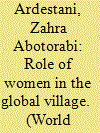

|
|
|
|
|
|
|
|